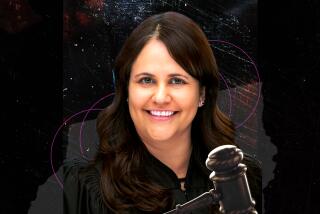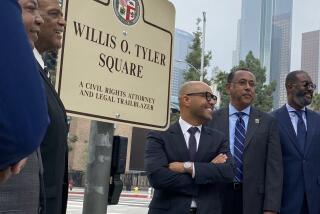Cecil Poole; 1st Black U.S. Judge in N. California
- Share via
SAN FRANCISCO — Cecil F. Poole, who was the first black federal judge in Northern California and who also served on the U.S. 9th Circuit Court of Appeals, died Wednesday at 83, the court said.
Poole was appointed to the appeals court by President Jimmy Carter in November 1979 after 3 1/2 years on the U.S. District Court in San Francisco. He transferred to semiretired senior status in January 1996, timing his action to coincide with Martin Luther King Jr.’s birthday on Jan. 15.
Poole started practicing law in his native Pennsylvania in 1939 and later served as chief of regional appeals for the U.S. Office of Price Administration in San Francisco, as an assistant district attorney and as legal counsel and clemency secretary for Gov. Edmund G. “Pat” Brown in from 1959 to 1961.
He was appointed U.S. attorney by President John F. Kennedy in 1961, the first black to hold that job in San Francisco, and served until 1969, when he entered private law practice. President Lyndon B. Johnson nominated him to the District Court twice but he was not confirmed.
According to a Los Angeles Daily Journal profile, Poole’s first nomination, in 1968, was torpedoed by Sen. George Murphy (R-Calif.) because of Poole’s dismissal of federal conspiracy charges against five antiwar demonstrators the previous year.
The five were engaged in a sit-in at the Oakland draft center when a federal marshal grabbed them and charged them with seditious conspiracy. Poole, as chief federal prosecutor, had told marshals to let local authorities remove the demonstrators unless they were assaulting someone or destroying federal property.
In 1969, Poole was one of the last judges Johnson nominated before leaving office, but his name was withdrawn after President Richard Nixon took office. He finally became a judge in 1976 after being nominated by Nixon’s successor, Gerald R. Ford.
He was also a director of the NAACP Legal Defense and Educational Fund, a trustee of the Urban League and a law professor at UC Berkeley before taking the bench.
On the court, Poole was generally moderate to liberal in civil cases and somewhat more conservative in criminal cases.
Poole is survived by a daughter, Patricia Mary Poole of Novato.
More to Read
Sign up for Essential California
The most important California stories and recommendations in your inbox every morning.
You may occasionally receive promotional content from the Los Angeles Times.










